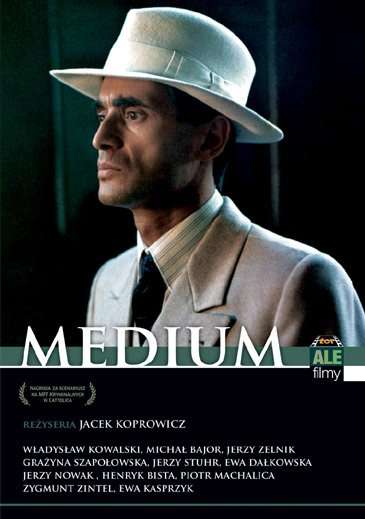Suspenseful for most of its length, though a letdown at the end, this psychic thriller is about four very different people who are drawn to one particular place in the town of Sopot, a resort on the Baltic Sea. The time is 1933, and it so happens that 50 years earlier, a foul murder was committed here. Involved in that offense were four people who are dead-ringers for the four now gathering in Sopot. The modern versions of the four dead people are a police commissioner, a schoolteacher, a hunchback, and someone who just happens to be visiting from Berlin. As the police commissioner begins to gather evidence, he comes to the conclusion that this murder might just be a cyclical occurrence.Read More »
1980s
-
Jacek Koprowicz – Medium (1985)
1981-1990HorrorJacek KoprowiczMysteryPoland -
Wim Wenders – Chambre 666 AKA Room 666 (1982)
Documentary1981-1990FranceWim WendersSynopsis:
During the 1982 Cannes Film Festival, Wenders asks a number of film directors from around the world to get, each one at a time, into a hotel room, turn on the camera and sound recorder, and, in solitude, answer a simple question: “What is the future of cinema?”.Read More » -
Kazuo ‘Gaira’ Komizu – Bijo no harawata AKA Entrails of a Beautiful Woman (1986)
1981-1990CultExploitationJapanKazuo 'Gaira' Komizu
Synopsis:
The Yakuza brutally rape a young woman and dope her up on “Angel Rain”, a pure form of cocaine with the intention of selling her into slavery. Before the Yakuza’s nefarious plot materializes, the woman escapes only to commit suicide in front of a psychiatrist who swears to revenge her death. Unfortunately, for the psychiatrist, the Yakuza discover the plot and brutally rape and kill the psychiatrist—or so they thought. The psychiatrist comes back to life as a large demon with a monster penis hellbent to enact a bloody revenge.Read More » -
Cyril Collard – Alger la blanche (1986)
1981-1990Cyril CollardDramaFranceQueer Cinema(s)Short FilmQuote:
The story of a passion between Jean and Farid, thwarted by uncomprehension, opposite cultures, and impossible departures. linkRead More » -
Liliana Cavani – La pelle aka The Skin [+Extras] (1981)
1981-1990DramaItalyLiliana CavaniThe Female GazeWarBased on the short stories of Curzio Malaparte, The Skin is Liliana Cavani s controversial look at the aftermath of the German occupation of Italy during WWII and the equally difficult results of life during the Allied liberation. Marcello Mastroianni stars as writer Malaparte, who chronicled the desperate measures taken by his countrymen in order to survive. Burt Lancaster co-stars as the liberating American General unable to understand the devastation around him.Read More »
-
Frank Ripploh – Taxi zum Klo (1980)
Drama1971-1980Frank RipplohGermanyQueer Cinema(s)

Quote:
In this autobiographical feature, Frank Ripploh plays himself: a German elementary-school instructor who lives a double life in his beloved Berlin, socializing with his fellow teachers only when he has to, and venturing into a world of anonymous sex whenever he can. In-between bathroom encounters and trips with his colleagues to the bowling alley, Ripploh manages to forge a steady relationship with a handsome, sad-eyed theater manager named Bernd Broaderup. As Ripploh’s sexual ardor for Broaderup gives way to a wandering eye, and Broaderup begins pressuring Ripploh to give up the city and its many temptations, the couple’s relationship replays a scene that was occurring in urban areas across the world and was satirized in such cultural snapshots as the Larry Kramer novel Faggots. Ripploh, who wrote, directed, and starred in Taxi Zum Klo, which, unlike most German films at the time, received no state funding, saw the picture become an international art-house hit after it played at 1981’s New York and Berlin film festivals.Read More » -
Tinto Brass – Action (1980)
1971-1980DramaEroticaItalyTinto BrassDescription: Bruno is an idealistic hero who questions the meaning of life in this confusing and sometimes hallucinatory erotic drama. After a night in jail, he is gang-raped by punk rockers in a garbage dump. He later saves an old man who believes he is Garibaldi and a woman he believes is Ophelia. Bruno watches helplessly as she later jumps from a window.
Read More » -
Nikos Panayotopoulos – Melodrama? (1980)
Drama1971-1980ArthouseGreeceNikos PanayotopoulosSynopsis
A 30-year-old man (Lefteris Vogiatzis) returns from America suffering an existential crisis. He goes to Corfu to see his sick mother and tries to find happiness through a desperate love affair with a young music teacher (Maria Xenoudaki). Along the way, he loses his love and ends his sick mother’s suffering.
IMDb.comRead More » -
Aleksandr Zarkhi – Dvadtsat shest dney iz zhizni Dostoevskogo AKA 26 Days in the Life of Dostoyevsky (1981)
1981-1990Aleksandr ZarkhiDramaUSSR
Twenty-Six Days in the Life of Dostoyevsky was entered on February 16th at the 1981 Berlin Film Festival to commemorate the 100th anniversary of Dostoyevsky’s death on February 9th, 1881, and won a “Best Actor” award for Anatoly Solonitsyn as Dostoyevsky. Solonitsyn was a favorite actor in Andrei Tarkovsky’s films, and this was to be his penultimate role. This brief imaginary period in the famed Russian writer’s life encapsulates one of his darker moments in 1866. At that time he was still a relatively unknown writer whose first widely acclaimed work, Crime and Punishment, was just on the horizon. His life was at a very low ebb as he struggled with debts he could not pay, and as he fought depression over the loss of his wife to tuberculosis, and the death of his brother, who was very close to him. His first literary journal had to be scrapped because of political reasons, and the second venture needed funding. The police come to see him, sent by his publisher who is demanding recompense for debts overdue. Desperate to escape the pressure on all sides, Dostoyevsky decides to undertake the impossible and write the story of The Gambler in 26 days, thereby satisfying the debt to the publisher at least.Read More »






